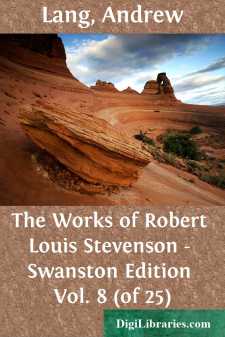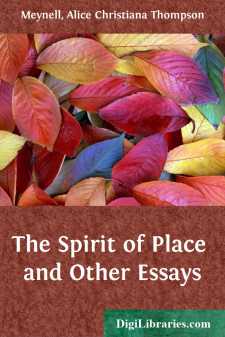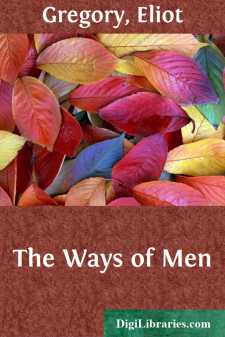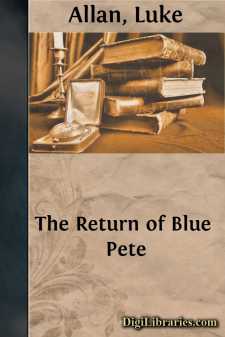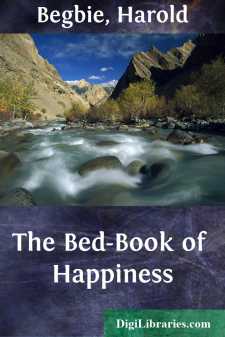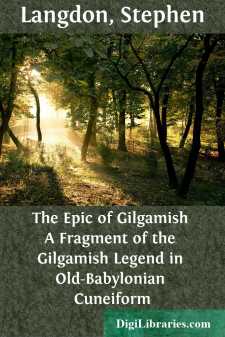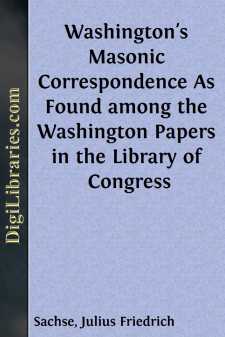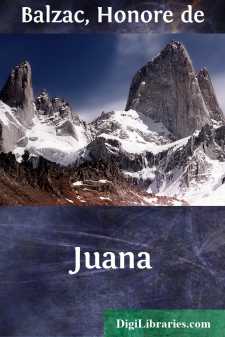Literary Collections
- American 84
- Ancient, Classical & Medieval 14
- Asian 1
- Australian & Oceanian 1
- Canadian 55
- Continental European 121
- English, Irish, Scottish, Welsh 179
- Essays 160
- General 24
- Letters 46
- Middle Eastern 1
Literary Collections Books
Sort by:
by:
Andrew Lang
JOHN AMEND-ALL On a certain afternoon, in the late spring-time, the bell upon Tunstall Moat House was heard ringing at an unaccustomed hour. Far and near, in the forest and in the fields along the river, people began to desert their labours and hurry towards the sound; and in Tunstall hamlet a group of poor country-folk stood wondering at the summons. Tunstall hamlet at that period, in the reign of old...
more...
THE SPIRIT OF PLACE With mimicry, with praises, with echoes, or with answers, the poets have all but outsung the bells. The inarticulate bell has found too much interpretation, too many rhymes professing to close with her inaccessible utterance, and to agree with her remote tongue. The bell, like the bird, is a musician pestered with literature. To the bell, moreover, men do actual violence. You...
more...
by:
Eliot Gregory
CHAPTER 1—“Uncle Sam” The gentleman who graced the gubernatorial armchair of our state when this century was born happened to be an admirer of classic lore and the sonorous names of antiquity. It is owing to his weakness in bestowing pompous cognomens on our embryo towns and villages that to-day names like Utica, Syracuse, and Ithaca, instead of evoking visions of historic pomp and circumstance,...
more...
by:
Luke Allan
CHAPTER I MAHON ON THE TRAIL Sergeant Mahon emptied the barracks mail bag on the desk before Inspector Barker and stood awaiting instructions. The Inspector passed his hand over the small pile of letters and let his eye roam from one to another in the speculative way that added zest to the later revelation of their contents. One from headquarters at Regina he set carefully aside. With an "ah!"...
more...
by:
Harold Begbie
THE BED-BOOK OF HAPPINESS THEISSE[Sidenote: Richter] In his seventy-second year his face is a thanksgiving for his former life, and a love-letter to all mankind. RICHTER[Sidenote: Carlyle] We have heard that he was a man universally loved, as well as honoured … a friendly, true, and high-minded man; copious in speech, which was full of grave, genuine humour; contented with simple people and simple...
more...
by:
Various
THE ROMANTIC PHILOSOPHERS—FICHTE, SCHELLING, AND SCHLEIERMACHER By FRANK THILLY, PH.D., LL.D. Professor of Philosophy, CornellUniversity The Enlightenment of the eighteenth century had implicit faith in the powers of human reason to reach the truth. With its logical-mathematical method it endeavored to illuminate every nook and corner of knowledge, to remove all obscurity, mystery, bigotry, and...
more...
by:
Stephen Langdon
Introduction In the year 1914 the University Museum secured by purchase a large six column tablet nearly complete, carrying originally, according to the scribal note, 240 lines of text. The contents supply the South Babylonian version of the second book of the epic ša nagba imuru, “He who has seen all things,” commonly referred to as the Epic of Gilgamish. The tablet is said to have been found at...
more...
FOREWORD Washington's Masonic correspondence as found among the Washington papers in the Manuscript department of the Library of Congress, affords an insight of the great esteem in which Washington held the Masonic Fraternity, of which since his early days he had been an honored member. This is further shown by his great courtesy to the Brethren, in his replies to their addresses, no matter...
more...
by:
Kuno Francke
CHAPTER I Edward—so we shall call a wealthy nobleman in the prime of life—had been spending several hours of a fine April morning in his nursery-garden, budding the stems of some young trees with cuttings which had been recently sent to him. He had finished what he was about, and having laid his tools together in their box, was complacently surveying his work, when the gardener came up and...
more...
by:
Honore de Balzac
CHAPTER I. EXPOSITION Notwithstanding the discipline which Marechal Suchet had introduced into his army corps, he was unable to prevent a short period of trouble and disorder at the taking of Tarragona. According to certain fair-minded military men, this intoxication of victory bore a striking resemblance to pillage, though the marechal promptly suppressed it. Order being re-established, each regiment...
more...


